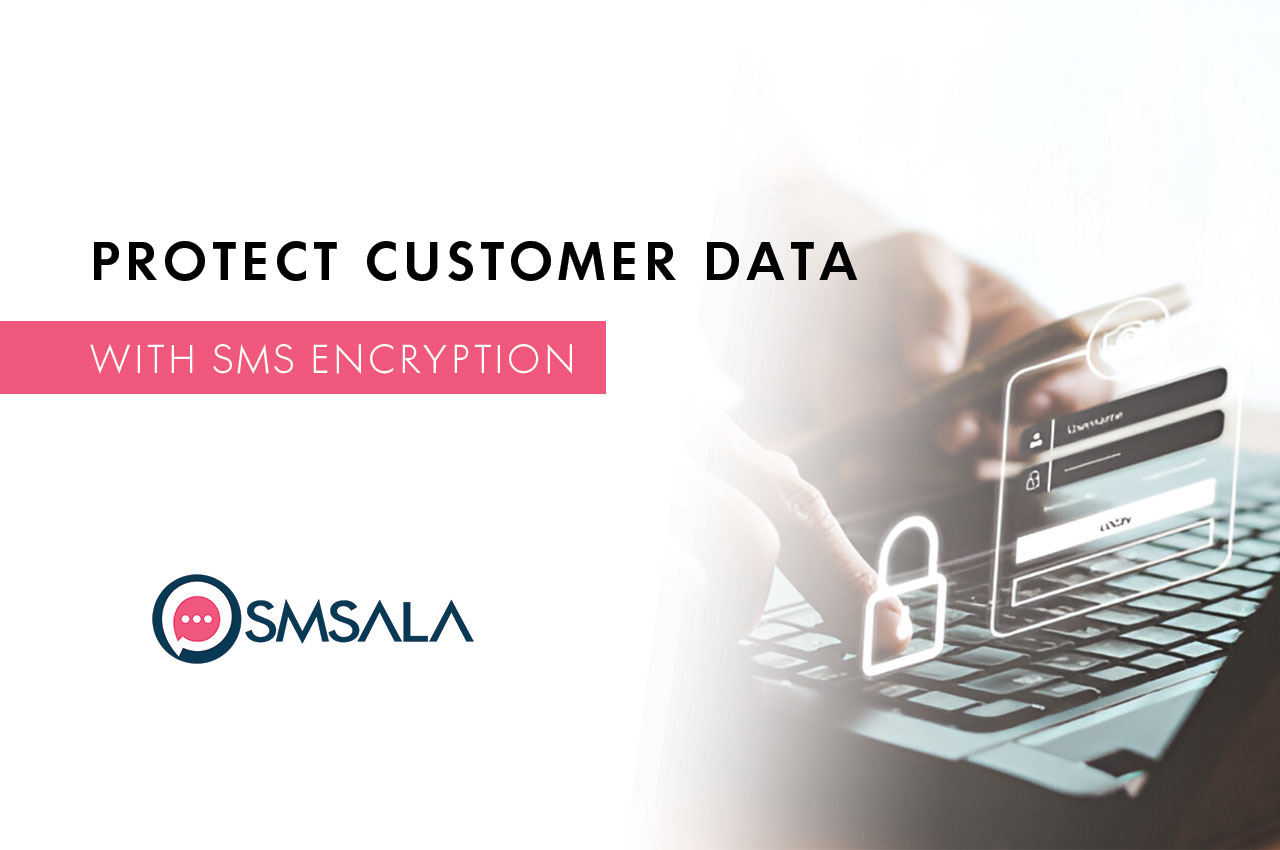In an era where digital communication is at the core of business operations, protecting customer data has never been more critical. Every day, businesses handle sensitive information, such as payment details, personal identification, and confidential communications, all of which must be safeguarded against breaches and unauthorized access. One communication channel that is frequently used yet often overlooked when it comes to data protection is SMS.
While SMS remains one of the most effective ways to reach customers due to its high open rates and immediacy, it also poses risks. Unencrypted SMS messages can be intercepted, exposing sensitive data to potential hackers. This is where SMS encryption becomes vital.
In this guide, we will explore the significance of SMS encryption, how it works, the various types available, and the best practices for implementing it in your business. By the end of this article, you’ll understand how encryption can safeguard customer data and help you comply with data protection regulations.
What is SMS Encryption?
SMS encryption refers to the process of securing text messages through cryptographic methods, ensuring that only the intended recipient can access the message’s content. Without encryption, SMS messages travel as plain text, which makes them vulnerable to interception and exploitation by malicious actors.
Encryption works by encoding the message in such a way that it becomes unreadable to anyone except the intended recipient, who has the key to decrypt it. This ensures that even if the message is intercepted, the content remains protected.
Types of Encryption
Encryption generally comes in two forms:
- Symmetric Encryption: This method uses the same key for both encryption and decryption. The challenge here is ensuring that both the sender and recipient securely share the key.
- Asymmetric Encryption: In this method, a pair of keys is used—a public key for encryption and a private key for decryption. This form is considered more secure as only the recipient can decrypt the message with their private key.
Popular encryption standards, such as AES (Advanced Encryption Standard), are widely used to ensure that SMS messages remain secure throughout their journey from sender to recipient.
Why SMS Encryption is Essential for Data Security
As businesses increasingly rely on SMS to communicate with customers, protecting these interactions is paramount. Standard SMS messages are not inherently secure; they can be intercepted at various points, such as during transmission over wireless networks or by malicious applications on a recipient’s device. The consequences of data breaches can be severe, including financial loss, reputational damage, and legal penalties.
Vulnerabilities of Unencrypted SMS
Unencrypted SMS messages are exposed to numerous threats, including:
- Man-in-the-Middle Attacks: Hackers can intercept messages between the sender and recipient.
- Device Compromise: If a device is infected with malware, sensitive SMS data can be accessed by attackers.
- Network Snooping: Messages can be intercepted as they pass through mobile networks, especially on unsecured or poorly encrypted wireless networks.
The Role of Encryption in Preventing Attacks
By using encryption, businesses can protect SMS data even if the message is intercepted. When a message is encrypted, it appears as a scrambled set of characters to anyone without the correct decryption key. This reduces the risk of data theft, ensuring that sensitive customer information—such as passwords, account details, and personal identification numbers (PINs)—remains secure.
How SMS Encryption Works
Understanding how SMS encryption works is essential for businesses looking to protect their communications. Here is a breakdown of the process:
- Message Encryption: The sender writes a message that is encrypted before being sent. This encryption can be done either on the sender’s device or through an SMS gateway that applies the encryption.
- Transmission Through Secure Channels: The encrypted message is transmitted through the mobile network, passing through various nodes such as mobile towers, network servers, and potentially even third-party SMS aggregators.
- Decryption by the Recipient: The recipient’s device, or an authorized application, receives the encrypted message and uses the corresponding decryption key to convert it back into a readable format.
There are two main types of encryption methods used for SMS:
- End-to-End Encryption (E2EE): This method encrypts the message from the moment it is sent until it is decrypted by the recipient, ensuring complete privacy throughout the entire communication process.
- Encryption in Transit: This approach protects the message as it travels through the network, but it may still be vulnerable once it reaches the recipient’s device.
Both methods provide a layer of security, but end-to-end encryption is considered more robust, as it eliminates vulnerabilities at all stages of transmission.
Types of SMS Encryption: Which One is Right for Your Business?
Choosing the right encryption method for your business depends on the level of security you need and the nature of your communications. Here are the three most common types of SMS encryption:
1. End-to-End Encryption (E2EE)
End-to-end encryption ensures that only the sender and recipient can read the contents of the message. This is the most secure form of encryption and is widely used by messaging apps like WhatsApp and Signal. E2EE is ideal for businesses handling highly sensitive customer information, such as financial institutions, healthcare providers, and legal services.
2. Encryption in Transit
Encryption in transit protects data while it is being transmitted across networks. This method secures the message from interception by encrypting it during transmission but does not guarantee its security once it reaches the recipient’s device. This method is suitable for businesses that need to protect messages from network-based threats but may not handle highly sensitive data.
3. Cloud-Based Encryption
Some businesses use cloud services to store and manage SMS communications. In this case, cloud-based encryption ensures that all messages stored in the cloud are encrypted, safeguarding them from unauthorized access. This option is particularly useful for businesses that handle large volumes of SMS messages and need to store them for future reference.
Benefits of SMS Encryption for Businesses
Implementing SMS encryption offers numerous benefits for businesses, from compliance with regulatory requirements to building trust with customers. Here are some of the top reasons to adopt SMS encryption:
1. Data Protection
The most obvious benefit of encryption is data protection. By securing SMS communications, businesses can prevent unauthorized access to sensitive information, such as payment details, personal identification, and login credentials. This reduces the risk of fraud, identity theft, and financial losses for both the business and its customers.
2. Compliance with Regulations
Many industries are subject to strict data protection regulations, such as GDPR (General Data Protection Regulation) in Europe, HIPAA (Health Insurance Portability and Accountability Act) in healthcare, and CCPA (California Consumer Privacy Act) in the U.S. These regulations often require businesses to implement encryption for communications that contain sensitive data. Failing to comply with these regulations can result in hefty fines and legal consequences.
3. Enhanced Customer Trust
Customers are increasingly aware of data security risks, and businesses that take proactive steps to protect their data are more likely to earn their trust. By implementing SMS encryption, businesses can demonstrate their commitment to data privacy, enhancing customer loyalty and satisfaction.
4. Risk Mitigation
Encryption helps mitigate the risk of data breaches and cyberattacks. Should a breach occur, encrypted data is much harder for attackers to exploit. This not only protects customer data but also minimizes the potential financial and reputational damage to the business.
Implementing SMS Encryption: Best Practices
While encryption is a powerful tool for securing SMS communications, it must be implemented correctly to be effective. Here are some best practices for businesses to follow when implementing SMS encryption:
1. Use Strong Encryption Standards
Ensure that your encryption solution uses strong, widely recognized standards like AES-256. These standards provide a high level of security and are considered virtually unbreakable with current technology.
2. Regularly Update Encryption Keys
Encryption keys should be rotated and updated regularly to reduce the risk of compromise. Using the same encryption key for too long can expose your communications to vulnerabilities, so it’s important to have a system in place for periodic key updates.
3. Partner with a Reputable Encryption Provider
When choosing an encryption provider, work with companies that have a proven track record of security and compliance. Look for vendors that offer end-to-end encryption and have certifications such as ISO 27001 for information security management.
4. Monitor for Vulnerabilities
Even with encryption in place, businesses should continuously monitor their SMS communications for vulnerabilities. This includes keeping software and encryption protocols up-to-date and conducting regular security audits to identify and address potential weaknesses.
Challenges of SMS Encryption and How to Overcome Them
While SMS encryption provides significant security benefits, it can present challenges that businesses need to be aware of. Here are some common challenges and how to address them:
1. Compatibility Issues
Some older devices or mobile networks may not support advanced encryption protocols, making it difficult to implement encryption across all communication channels. To overcome this, businesses should use device-agnostic encryption solutions that work across a wide range of devices and platforms.
2. Cost and Complexity
Implementing encryption can be costly, particularly for small businesses. The process of encrypting SMS communications, managing encryption keys, and ensuring compliance with regulations can require significant investment in time and resources. However, the long-term benefits—such as avoiding data breaches and regulatory fines—far outweigh the costs.
3. Key Management
Managing encryption keys securely can be a challenge, especially for businesses that send large volumes of SMS messages. To address this, businesses should consider using automated key management tools that handle key rotation and storage securely, reducing the risk of human error or key compromise.
SMS Encryption for Various Industries
Different industries have unique data security needs, and SMS encryption can be tailored to meet these specific requirements. Here are some examples of how SMS encryption is used across various sectors:
1. Banking and Finance
In the banking sector, SMS messages are often used to send account notifications, transaction alerts, and one-time passwords (OTPs). Encrypting these messages is essential for protecting sensitive financial information and complying with regulations like PCI DSS.
2. Healthcare
Healthcare providers use SMS to communicate with patients about appointments, test results, and treatment plans. Under HIPAA, healthcare organizations must ensure that all patient data, including SMS communications, is encrypted to protect patient privacy.
3. E-commerce
In the e-commerce industry, SMS is frequently used to send order confirmations, delivery notifications, and promotional offers. Encrypting these messages helps protect customer payment details and personal information from unauthorized access.
4. Telecommunications
Mobile network operators often send SMS messages to customers with account updates and service notifications. Encrypting these communications helps protect user data and ensures compliance with industry regulations.
FAQs About SMS Encryption
To provide further clarity on SMS encryption, here are some frequently asked questions:
1. What is SMS encryption, and why is it important?
SMS encryption is the process of securing text messages by encoding their content so only the intended recipient can read it. It is important because it protects sensitive customer data from interception and unauthorized access.
2. How does SMS encryption work for businesses?
SMS encryption works by encrypting the content of a message before it is sent, ensuring that it remains secure during transmission. The recipient uses a decryption key to convert the message back into readable text.
3. Is SMS encryption necessary for compliance with data protection laws?
Yes, many data protection laws, such as GDPR and HIPAA, require businesses to implement encryption for communications that contain sensitive customer information.
4. Can all devices support SMS encryption?
Most modern devices and networks support SMS encryption, but older devices or networks may not be compatible with advanced encryption protocols.
5. What happens if an encrypted SMS is intercepted?
If an encrypted SMS is intercepted, the content remains unreadable without the decryption key, ensuring that sensitive data is not exposed to unauthorized parties.
Conclusion: Protect Your Customer Data with SMS Encryption Today
In a world where data breaches and cyberattacks are becoming more frequent, SMS encryption is an essential tool for protecting customer information. By encrypting SMS communications, businesses can safeguard sensitive data, comply with regulatory requirements, and build trust with their customers.
If your business relies on SMS to communicate with customers, now is the time to implement SMS encryption solutions. By following best practices and choosing the right encryption methods, you can ensure that your customer data remains secure and protected from potential threats.



